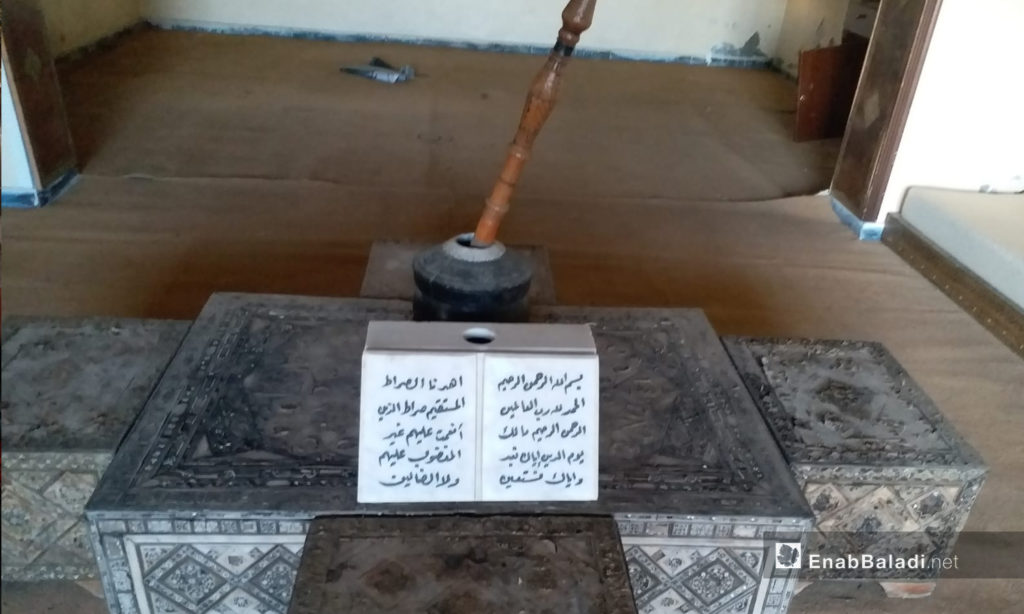Enab Baladi – Quneitra
Two years after the Syrian regime retook control of the town of Jubata al-Khashab, in the northern countryside of Queitra, southern Syria, the statue of Ahmed Marioud, “the leader of South Syria and Golan revolution against the French,”stands semi-destroyed and neglected due to the bombings even though Marioud’s name is stilled mentioned as a national hero in observance of the Evacuation Day, Syria’s national day commemorating the evacuation of the last French soldier and Syria’s proclamation of full independence and the end of the French mandate of Syria on 17 April 1946.
Alaa visits his grandfather’s house, known as a national attraction in the town, to see the destruction and damage inflicted on the house by the shells of the Syrian regime forces that fell in the yard of the house, its gate and its statue set up at the side of the yard.
Nothing was left in the guest room except for his grandfather’s photo hung on the wall, “ The destruction of my grandfather’s house recalls the destruction of the city of Quneitra during the war between Syria and Israel,” Alaa told Enab Baladi.
The town of Jubata al-Khashab got out of the control of the Syrian regime at the start of the popular protests and the formation of local opposition factions. The Syrian regime’s media outlets described the residents of the town as “terrorists,” and they accused them of working for Israel, which the townspeople deny and consider it the first reason behind neglecting the house’s restoration: “the Symbol of Resistance.”
Who is Ahmed Marioud?
Ahmed Marioud was born in the town of Jubata al-Khashab in 1886 and died in 1926.
Marioud led a revolution that included Syria and Jordan after he clashed with the French forces that invaded Syria between 1920 and 1946.
Marioud was killed with his younger brother in a battle that took place in his town.
His body was taken and displayed by the French in the capital, Damascus, mainly in “Marjeh Square” to terrorize the people about their fate if they showed resistance to the French occupation. However, the Damascenes brought him down and buried him in the “Atika” cemetery.
Ahmed Marioud’s story is of special significance for his town’s people, who describe their feelings towards him as “pride.”
The Syrian regime enhanced these feelings by taking care of his biography and celebrating it with the memory of “Evacuation Day, on 17 April of each year.
The Syrian regime took care of Marioud’s house, which was built on an area of 400 square meters, before the “October War” in 1973, after which the fate of the town was to fall into the “demilitarized” zone between Syria and Israel, according to the 1974 agreement.
In 2015, when the area was under the control of the opposition factions, Marioud’s house was bombed and destroyed, which was attributed by the state-run Syrian Arab News Agency (SANA) to shells fired by “terrorists” at the house of “the martyr.”
The testimonies of the people of the region confirm that it was the Syrian regime forces who fired the shells.
People of Jubata al-Khashab are accused of being terrorists and agents
The residents of Jubata al-Khashab were among the first who participated in the popular protests, which broke out in 2011.
Despite the presence of “the UN” peacekeepers,” the area was bombed and targeted several times throughout the war. In addition, many opposition factions were active in the area such as “Jabhat al-Nusra” and “Ahrar al-Sham.”
Jubata al-Khashab’s location adjacent to the Israeli occupied Palestine borders, and its mountainous terrain, increased its military importance.
With the Israeli propaganda of its “support” for the rebels and its provision of humanitarian aid, the Syrian regime had an excuse to describe its opponents within the town as “agents.”
The residents of Jubata al-Khashab were prevented from approaching the border with Israel, under penalty of legal accountability by the military security in the area before the war. After that, United Nations reports monitored “individuals, most of whom are shepherds,” approaching the cease-fire fence, carrying “unidentified” objects. Other people crossed the fence for a short time.
The Israeli government “clearly affirmed” to the United Nations that it refused the entry of Syrian displaced persons into its lands during a military campaign and forced the region’s inhabitants to hand over to the regime forces and its ally Syria in July 2018.
However, Israel informed the United Nations Office for the Coordination of Humanitarian Affairs that it “provided 30 assistance operations for displaced persons in the region.”
The Syrian government stopped describing the residents of Jubata al-Khashab as “terrorists” and “agents” after deporting the opposition fighters and their families to northern Syria. However, the Syrian government only gives unfulfilled promises of reforms to Marioud’s descendants while the “Military Housing Foundation” does not renovate the house of “the hero,” which was described in 2019 as a bright torch for the facts of the history of struggle by the government newspaper of “al-Thawra.”
The people considered this evidence of a“ symbolic punishment ”for their town, whose borders were inhabited by nothing but some“ usual ”bullets of Israel towards their town.

